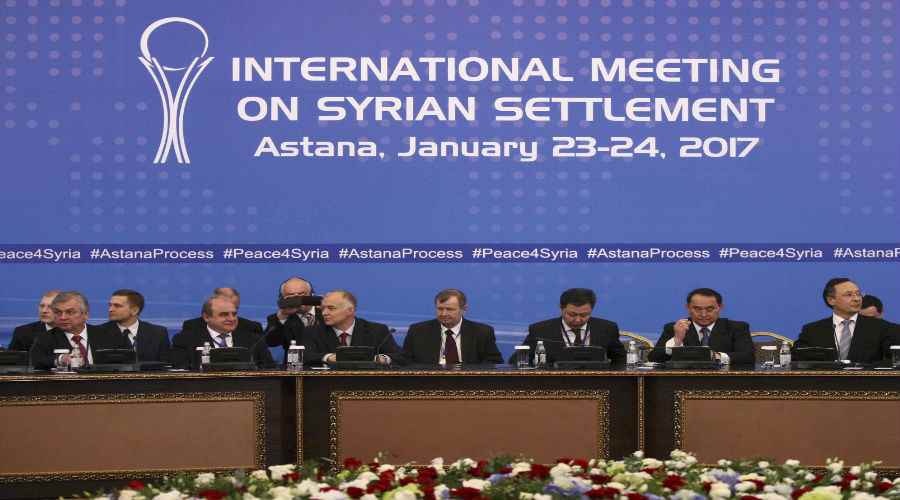ISIS and Jabhat Fateh al-Sham (previously known as al-Nusra Front) have shown a great deal of interest in the results of the Astana conference. The conference took place on January 23-24, 2017, under the sponsorship of Russia, Turkey and Iran. The outcome of the conference and its closing statement, which the Syrian regime and the opposition did not sign, stated that the sponsors of the conference are committed to combatting both ISIS and Jabhat Fateh al-Sham, and sidelined them from other opposition groups. The cooperation found during the Astana conference is likely to continue during the Geneva negotiations set to occur later this month. The talks in Geneva were originally scheduled for February 8, 2017, but were postponed by Russia.
Both ISIS and Jabhat Fateh al-Sham are attempting to adopt a number of strategies to deal with the outcome of the negotiations. These strategies are likely to be aimed towards the armed opposition and the regional and international powers that sponsored the conference. Possible tactics could include increasing the number of armed attacks against the opposition, or widening the scope of their targets to include states that sponsored the conference. There is also the possibility that these groups may open an entirely new front. United in their singular goal of hindering progress initiated by the conference, there is the potential for cooperation between ISIS and Jabhat Fateh al-Sham in the near future, however there are notable hurdles to such an alliance.
Multiple Options:
The following outlines the most likely courses of action for ISIS and Jabhat Fateh al-Sham:
1. Increasing military operations against factions that took part in the conference: This tactic has already been adopted by Jabhat Fateh al-Sham as seen by their recent attack against the Jaish al-Mujahideen, one of the factions that took part in the negotiations. Skirmishes took place in both the western suburbs of Aleppo and in Idlib.
Jabhat Fateh al-Sham has accused other factions of conspiracy, and of attempting to hand over control of gained territories to the International Alliance led by the US. Lately, the alliance has increased the number of attacks against Jabhat Fateh al-Sham.
Due to the intensity of strikes carried out by Jabhat Fateh al-Sham against Jaish al-Mujahideen, the group has threatened to hand over controlled territories to regime forces and their militia allies. Other factions have even considered joining the Ahrar al-Sham group in order to prevent Jabhat Fateh al-Sham from attacking their positions and personnel. These groups include Suqour Al Sham, Jaysh al-Islam (Idlib faction), Thuwar al-Sham Battalion, al-Jabha al-Shamiya (western Aleppo faction), and the Fastaqim Kama Umirt Union.
2. A possible alliance between ISIS and Jabhat Fateh al-Sham: A number of reports have shown that due to mounting pressure on both groups, the inclusion of so many armed factions at the Astana conference, and increased attacks by the International Alliance, ISIS and Jabhat Fateh al-Sham will need to establish some level of cooperation. As new consequences emerge from the negotiations, these groups will need to collectively develop practical policies to implement on the ground.
On January 3, 2017, airstrikes against positions held by Jabhat Fateh al-Sham in the town of Sarmada, near Idlib, led to the deaths of 25 members. Jabhat Fateh al-Sham claimed that the International Alliance was responsible for the strikes. Furthermore, ISIS positions in Deir ez-Zor have recently come under attack from Russian airstrikes working in coordination with ground forces involved in Operation Euphrates Shield near the city of al-Bab.
The possibility of cooperation between ISIS and Jabhat Fateh al-Sham does not negate their differences, particularly given their past feuds. However, the results of the conference could force these groups to shelve their disputes in order to cope with increasing regional and political pressures.
3. Targeting the interests of those who sponsored the conference: Since Turkey officially classified ISIS and Jabhat Fateh al-Sham as terrorist groups on January 26, 2017, a number of assessments predict that both groups will carry out attacks in the country. Several attacks took place prior to the Astana conference. An example was the New Year’s Eve attack on a nightclub in Istanbul.
4. Hindering continuing negotiations: ISIS and Jabhat Fateh al-Sham will likely attempt to hinder negotiations in the near future to prevent regional actors from reaching any sort of compromise at the upcoming Geneva conference.
Both groups may move to pressure the armed opposition in order to have them fall back from their involvement in any new negotiations or they could work to widen the differences between them.
5. Establishing new alliances: After the end of the Astana Conference, Jabhat Fateh al-Sham transformed into a new entity named Hayyat Tahrir al-Sham. Other groups included in the merger were Liwa al-Haqq, the Ansar al-Din Front, Jaysh al-Sunna, and the Nour al-Din al-Zenki Movement. The merger came about when Jabhat Fateh al-Sham refused a call put out by Jabhat Ahrar al-Sham seeking to settle past differences. Jabhat Fateh al-Sham’s actions indicate an attempt to lessen the effects of the Astana conference’s agreements.
6. Expanding their respective spheres of influence: This has been ISIS’s policy as they attempt to reassert control over Deir ez-Zor. Reports suggest that some ISIS fighters, specifically Arab and foreign fighters, have been moved from their stronghold in Raqqa to Deir ez-Zor in order to open a new front against forces there. ISIS’s loss of control in Mosul, Raqqa and el-Bab indicates a struggle to deal with the pressures associated with ongoing operations on the ground.
In conclusion, the results of the Astana Conference may trigger a new phase in the conflict with ISIS and Jabhat Fateh el-Sham. However, any repercussive actions on the part of these groups will be tied to the results of the upcoming Geneva conference at the end of February. There, the regime and opposition forces will focus on their political differences, and those issues that represent the crux of the issue between both sides of the conflict.


